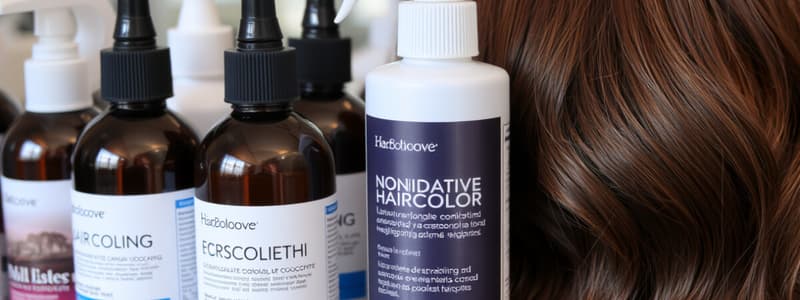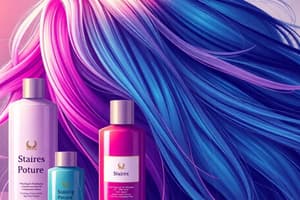Podcast
Questions and Answers
What is the primary characteristic of temporary haircolor?
What is the primary characteristic of temporary haircolor?
- Changes haircolor permanently
- Lasts for several weeks
- Enhances natural color
- Washes out with one shampoo (correct)
Which haircolor product lasts longer than semipermanent but not as long as permanent?
Which haircolor product lasts longer than semipermanent but not as long as permanent?
- Temporary haircolor
- Oxidizing haircolor
- Demipermanent haircolor (correct)
- Semipermanent haircolor
What is a use of semipermanent haircolor?
What is a use of semipermanent haircolor?
- Blends gray hair (correct)
- Neutralizes yellow tones
- Covers gray hair permanently
- Creates fun, bold colors
Which product is effective for neutralizing unwanted tones in gray hair?
Which product is effective for neutralizing unwanted tones in gray hair?
What describes oxidative haircolor products?
What describes oxidative haircolor products?
What type of haircolor is best for creating bright or natural-looking haircolor?
What type of haircolor is best for creating bright or natural-looking haircolor?
Which of the following is NOT a characteristic of demipermanent haircolor?
Which of the following is NOT a characteristic of demipermanent haircolor?
What is a common use for temporary haircolor?
What is a common use for temporary haircolor?
What is the primary purpose of a strand test in hair coloring?
What is the primary purpose of a strand test in hair coloring?
How do nonoxidizing haircolor products differ from oxidizing ones?
How do nonoxidizing haircolor products differ from oxidizing ones?
Flashcards are hidden until you start studying
Study Notes
Haircoloring Products Overview
- Haircoloring products are classified into two main categories: nonoxidative and oxidative.
- Nonoxidative haircolor products do not involve a chemical reaction and include temporary and semipermanent haircolor.
- Temporary haircolor washes out after one shampoo, making it easy to change looks.
- Semipermanent haircolor fades or washes out within a few weeks, offering a longer-lasting option without permanence.
- Oxidative haircolor products undergo a chemical reaction and include demipermanent and permanent haircolor.
- Demipermanent haircolor lasts longer than semipermanent but not as long as permanent, providing a middle ground.
- Permanent haircolor remains until the hair grows out, allowing for a significant and lasting change in hair color.
Nonoxidizing vs. Oxidizing
- The distinction between nonoxidizing and oxidizing products influences colorfastness, the ability to retain color on the hair.
- Colorfastness is affected by the chemical composition and molecular weight of the pigments and dyes in each product.
Patch Test
- Recommended before applying haircolor to check for allergic reactions.
- Detailed procedure and information can be found on pages 678-679.
Strand Test
- Conducted to assess how the hair will react to the chosen haircolor product.
- Detailed procedure and information can be found on pages 680-681.
Haircolor Classifications and Their Uses
-
Temporary Color:
- Creates bold, vibrant results that are easily removed with shampoo.
- Can neutralize unwanted tones, like yellow in gray hair (e.g., blue rinse).
- Ideal for introducing clients to haircolor services without commitment.
-
Semipermanent Color:
- Provides subtle color enhancements.
- Blends gray hair effectively.
- Enhances and tones natural hair color.
-
Demipermanent Color:
- Refreshes faded color effectively.
- Functions as a filler in color correction processes.
-
Permanent Haircolor:
- Offers a permanent change in hair color.
- Covers gray hair completely.
- Creates bright or natural-looking results for long-lasting effects.
Studying That Suits You
Use AI to generate personalized quizzes and flashcards to suit your learning preferences.





